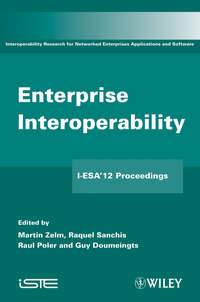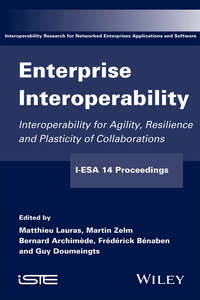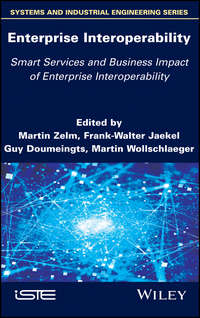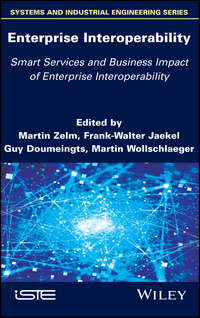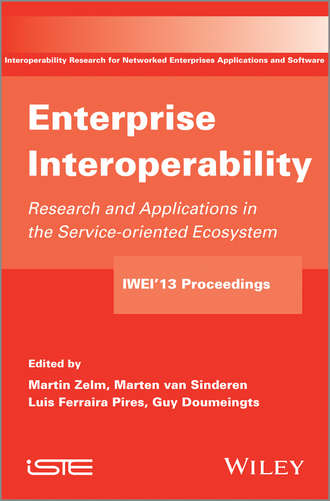
Полная версия
In a fast changing global economy governed by Enterprise Services and the Future Internet, enterprises and virtual factories will self-organize in distributed, interoperable, innovation Ecosystems where the issues of Enterprise Interoperability need to be solved in a multi-view of information, services and processes throughout Enterprise Networks. The book constitutes the proceedings of five workshops co- located with the Fifth IFIP Working Conference IWEI 2013. It contains the presented peer reviewed papers and summaries of the workshop discussions. Complementing the IWEI Conference program, the workshops aimed at exploiting new issues, challenges and solutions for Enterprise Interoperability and Manufacturing Eco Systems. The scope of the workshops spanned over a range of interoperability issues in Service Science and innovation, Model Driven Service Engineering Architectures, Service Modelling Languages, reference ontology for manufacturing , Case studies and tools particularly for SMEs, Business – IT alignment and related Standardization. Contents 1 – Model Driven Services Engineering Architecture (MDSEA): A Result of MSEE Project An Architecture for Service Modelling in Servitization Context: MDSEA, Y. Ducq. A Set of Templates for MDSEA, D. Chen. 2 – Interoperability to Support Business–IT Alignment Report Workshop 2, I.-S. Fan, V. Taratoukhine, M. Matzner. Interoperability as a Catalyst for Business Innovation, J.H.P. Eloff, M.M. Eloff, M.T. Dlamini, E. Ngassam, D. Ras. Process-Oriented Business Modeling – An Application in the Printing Industry, A. Malsbender, K. Ortbach, R. Plattfaut, M. Voigt, B. Niehaves. A Comparative Study of Modelling Methodologies Using a Concept of Process Consistency, E. Babkin, E. Potapova, Y. Zelenova. Maintenance Support throughout the Life-Cycle of High Value Manufacturing Products. Interoperability Issues, A. Fedotova, V. Taratoukhine, Y. Kupriyanov. Using Enterprise Architecture to Align Business Intelligence Initiatives, I.-S. Fan, S. Warner. Towards Enterprise Architecture Using Solution Architecture Models, V. Agievich, R. Gimranov, V. Taratoukhine, J. Becker. 3 – Standardisation for Interoperability in the Service-Oriented Enterprise Report Workshop 3, M. Zelm, D. Chen. Standardisation in Manufacturing Service Engineering, M. Zelm, G. Doumeingts. Service Modelling Language and Potentials for a New Standard, D. Chen. An Approach to Standardise a Service Life Cycle Management, M. Freitag, D. Kremer, M. Hirsch, M. Zelm. Open Business Model, Process and Service Innovation with VDML and ServiceML, A. J. Berre, H. De Man, Y. Lew, B. Elvesæter, B.M. Ursin-Holm. Reference Ontologies for Manufacturing, R. Young, N. Hastilow, M. Imran, N. Chungoora, Z. Usman, A.-F. Cutting-Decelle. Standardisation Tools for Negotiating Interoperability Solutions, T. Santos, C. Coutinho, A. Cretan, M. Beca, R. Jardim-Goncalves. 4 – Case Studies on Enterprise Interoperability: How IT Managers Profit from EI Research Report Workshop 4, S. Kassel. Experiences of Transferring Approaches of Interoperability into SMEs, F. Gruner, S. Kassel. 5 – Selected New Applications of Enterprise Interoperability . 179 Report Workshop 5, L. Ferreira Pires, P. Johnson. Service-Oriented Enterprise Interoperability in Logistics, W. Hofman. An Ontological Approach to Logistics, L. Daniele, L. Ferreira Pires. Social Vision of Collaboration of Organizations on a Cloud Platform, A. Montarnal, W. Mu, F. Bénaben, A.-M. Barthe-Delanoë, J. Lamothe. Semantic Standards Quality Measured for Achieving Enterprise Interoperability: The Case of the SETU Standard for Flexible Staffing, E. Folmer, H. Wu. Re


